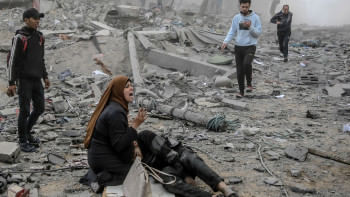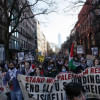How the Muslim world can do more for Palestine

November 29, the International Day of Solidarity with the Palestinian People, is observed each year to reaffirm the global community's commitment to Palestinian rights and draw attention to the ongoing struggles faced by the people of Palestine. This day serves as a solemn reminder of the enduring conflict, the unresolved question of Palestinian statehood, and the suffering endured by millions of Palestinians. Yet, despite its symbolic significance, the day often raises the same question, what tangible action has been taken by the international community, and more importantly, by the Muslim world, to address the plight of Palestine beyond mere statements of solidarity?
Decades of conferences, resolutions, and pledges from the Muslim world have failed to alleviate the daily suffering of Palestinians or halt the expansion of illegal Israeli settlements. The Organization of Islamic Cooperation (OIC) has played a significant role in advocating for Palestinian rights, issuing resolutions, providing humanitarian aid, and raising global awareness about the Palestinian struggle. However, despite these achievements, its adopted measures lack the strength to enforce international accountability or pressure Israel to end its occupation. Given its vast resources and potential, can the OIC overcome internal divisions and transform from a platform of declarations into an engine of real change in the pursuit of Palestinian justice?
The enduring Sunni-Shia divide continues to sap the strength of the Muslim world, turning potential allies into rivals. Rather than uniting for the Palestinian cause, regional giants like Saudi Arabia and Iran remain locked in ideological competition, often using Palestine as a symbolic prop for their own ambitions. This division has rendered the idea of collective action nearly impossible, despite the fact that Palestine's cause transcends sectarian lines. How long will the Muslim world allow internal divisions to impede solidarity on a cause as universal as Palestine, which hosts one of its holiest sites, the Al-Aqsa Mosque?
Calls for a joint Muslim military force to defend Palestine have long circulated within the Muslim world but remain unrealised. Instead, Muslim nations spend billions on fragmented military operations within their own borders or against one another, while Israel continues to expand its military superiority. Even during the most critical escalations, such as the blanket bombardments of Gaza—where the Prophet Muhammad's (peace be upon him) great-grandfather Hashim is buried—the Islamic world fails to present a coordinated military or defence strategy to protect innocent Palestinian civilians and its historic heritage. Why has the Muslim world, with its vast resources and military spending, failed to organise a defence mechanism for one of its most pressing humanitarian causes?
The combined military capabilities of the Muslim world represent a significant force that, if properly coordinated, could have a profound impact on global geopolitics. With over 50 Muslim-majority countries, the collective military expenditure of the Muslim world ranks among the highest globally, surpassing even the combined defence budgets of some major Western powers. If these nations were able to transcend their differences and pool their military resources, they could create a powerful deterrent to any aggressor and offer tangible security to Palestine. The question, however, remains: with such overwhelming potential, why has the Muslim world not yet unified its military might to defend Palestine and promote regional stability for the greater good?
Collectively, Muslim-majority countries control a significant portion of the world's energy resources, with the Gulf states alone accounting for nearly a third of global oil reserves. Additionally, the Muslim world represents around two billion people, a demographic that spans continents, cultures, and markets, making it one of the largest and most diverse blocs on the planet. Economic leverage, particularly in the form of oil, has historically proven effective in shaping global politics. Yet today, Muslim-majority nations seem reluctant to use their collective economic power for Palestine, prioritising trade deals and energy partnerships over justice. Why has the Muslim world abandoned its most potent weapon for plausible pressure? Can't two billion Muslims shield two million Gazans, or is the weight of a centuries-old conflict just too much for even the largest ummah to carry?
The Muslim world is further strategically positioned with key geographic advantages that could enhance its global influence. It controls vital chokepoints like the Strait of Hormuz and the Suez Canal, critical to global oil and trade routes. The region also holds vast mineral resources, including oil, gas, and rare earth metals essential for technology and energy. Additionally, the Bay of Bengal is a major trade hub, with nearly half of global container traffic passing through its ports. These assets provide Muslim-majority countries with significant strategic leverage and key roles in global supply chains. In a world where energy security and access to critical minerals are paramount, the Muslim world's control over these resources should be a powerful bargaining chip in shaping international policy. Yet, despite this wealth of resources, why has the Muslim world failed to wield its natural advantages for the cause of Palestine and broader regional empowerment?
The fact remains that, on the international stage, Muslim nations lag far behind Israel in diplomatic and media influence. Israel has mastered the art of lobbying, soft power, and public diplomacy, securing support from Western governments and global media outlets. In contrast, the Muslim world has not managed to leverage its substantial economic and demographic strength to shape global narratives or policies. Why has the Muslim world not invested in the cultural and diplomatic tools necessary to counter Israeli propaganda and build better global alliances? Nonetheless, the Muslim world possesses a wealth of intellectual and diplomatic skills, with influential voices in politics, academia, and international organisations. If this power were harnessed collectively, pooling resources for common causes, advocating for justice, and pressing for global change, it could shape the international landscape in profound ways.
History has shown that global movements, from South Africa's anti-apartheid struggle to Bangladesh's national uprising against discrimination and fascism, have succeeded through a combination of unity, strategy, and sustained pressure. The Muslim world has the resources, influence, and moral imperative to act, yet its disunity and complacency have left Palestine increasingly isolated. As the world marks another day of solidarity, the Muslim world must ask itself: will it remain a bystander in history, or will it rise to meet the moment?
Dr Iftekhar Ul Karim is assistant professor at BRAC Business School, BRAC University. He can be reached at [email protected].
Views expressed in this article are the author's own.
Follow The Daily Star Opinion on Facebook for the latest opinions, commentaries and analyses by experts and professionals. To contribute your article or letter to The Daily Star Opinion, see our guidelines for submission.


 For all latest news, follow The Daily Star's Google News channel.
For all latest news, follow The Daily Star's Google News channel. 









Comments